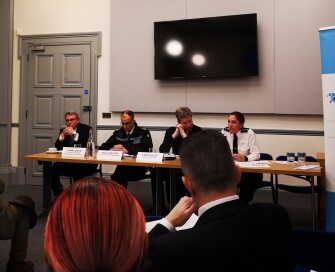Diss hosts policing and crime Q&A
Anti-social behaviour, rural crime, drugs and knife crime were some of the issues discussed at a special question and answer session hosted by Norfolk’s Police and Crime Commissioner (PCC) and Chief Constable in Diss yesterday evening.
Attended by South Norfolk residents and local councillors, the Diss Q&A event provided an opportunity for local people to find out about policing in their area, meet senior officers and raise their crime and policing concerns.
Regular public Q&As are part of the Commissioner’s ongoing pledge to give the public access to the county’s senior officers while ensuring he and the wider police service are visible, accessible and accountable to all.
The Diss Q&A completed a full cycle of events taking in each of the county’s districts. It was the second public Q&A of 2019, with the PCC and Chief Constable already having visited The Forum in Norwich early in the new year. In 2018, five Q&A sessions were hosted across the county, with events in Watton, Downham Market, Great Yarmouth, Cromer and Taverham.
District Chief Inspector Kersty Brooks gave those present at the Diss Corn Hall an overview of the types of crime affecting the area, as well as the policing priorities which had been set in conjunction with local communities.
PCC Lorne Green then invited questions for him, Chief Constable Simon Bailey and Deputy Chief Constable Paul Sanford.
With county lines drug activity and knife crime prominent in the national media, attendees were keen to know more about the approach to tacking these issues in Norfolk.
The Chief Constable said that the impact of having more fully warranted officers on the street as a result of Norfolk's new policing model was now being seen. In 2016, the force had 1,476 officers rising to 1,550 this year. He explained that investment in safer neighbourhood teams, along with Operation Gravity – Norfolk’s proactive policing approach to tackling county lines activity – had helped put the county in a good position.
Deputy Chief Constable Paul Sanford added that over 900 arrests had been made under Operation Gravity since it was launched. Many of those arrests, he told the meeting, were not of Norfolk residents but rather those from outside the county bringing drugs and associated criminal activity to the area. He said that the force’s response had made Norfolk a hostile environment for criminals and continued to send the message that the county was no easy target. As a result, he said, the force had seen the number of county lines in Norfolk roughly half since Operation Gravity was launched.
The PCC spoke about the preventative work going on in the county, including working with young people at risk of criminal exploitation or being affected by violent crime, and there was discussion of how policing teams were working with schools to help educate young people about the dangers of knife crime.
There was also discussion of the role of stop and search in tackling knife crime and whether officers felt able to use all of the policing powers available to them. In response, Deputy Chief Constable Paul Sanford said that stop and search was a useful tool for policing which, he said, was quite rightly scrutinised with officers accountable for their decisions. He said the force has invested in mobile technology to make the necessary stop and search paperwork easier and faster for officers to complete.
There was some frustration expressed by South Norfolk residents in relation to their experience of trying to contact the police and, more specifically, waiting times on the non-emergency 101 number. The Chief Constable said that he had heard similar frustrations at other public meetings and, as such, had been monitoring call handling very closely. He offered reassurance that improvements were being made in relation to 101 and also that, despite a big increase in emergency calls, the force was still meeting its 999 targets. He said that many of the calls coming through to 101 were not policing-related and attributed the wait experienced by those calling the force at certain times of the day to difficulties accessing other services, He told attendees that many public services closed their phone lines at 5pm and, being memorable, 101 was then their go-to.
In response to a question about using other contact methods, such as WhatsApp which is used in some counties for sharing intelligence relating to rural crime, the Chief Constable said he was looking at the possibilities offered by applications like WhatsApp but had to be careful to comply with legal requirements such as those set by the Information Commissioner’s Office (ICO).
The meeting also welcomed representatives from the Norfolk Youth Commission which was set up by the PCC to ensure young people’s voices were heard in discussions about policing and crime, and their needs understood by police and partners. The availability of diversionary activities for young people in South Norfolk was discussed with examples of graffiti walls used in some towns. The Youth Commission said it would be keen to work with the town council and policing team to support any projects or engagement with young people.
The next public Q&A will take place in West Norfolk in May 2019 (location and date to be confirmed).
